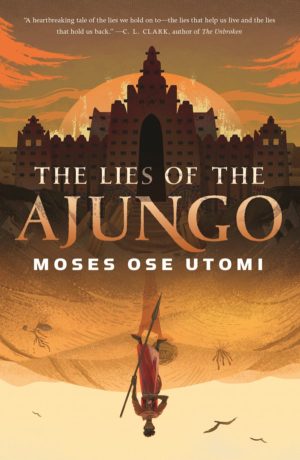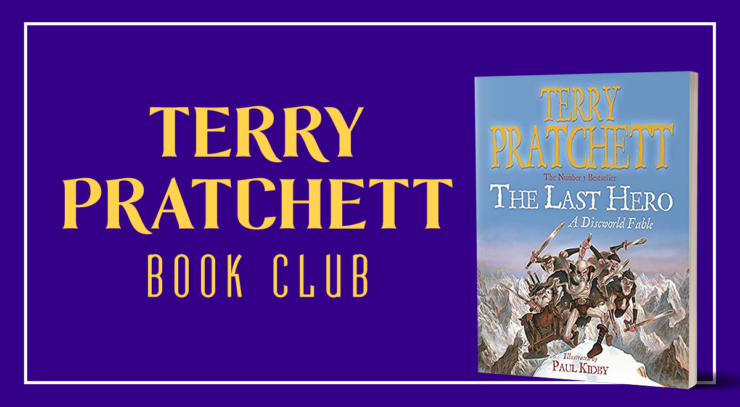He’s got a plain sword and makes a piddly salary and he’s here to save the world against impossible odds, so it’s very clear what part Carrot is playing in this tale…
Summary
The Kite crew get in touch with the ground crew once Carrot is no longer sitting on the omniscope shard. They did indeed land (after bouncing) and have found that the moon has air, vegetation, and its own special sort of dragon (that fires from the other end). Carrot notes that the old Watch mascot Errol was rather similar to them, perhaps a throwback. The crew stocks the ship with moon vegetation, failing to notice that the moon dragons only eat a leaf at a time (because Leonard, the only one who would notice, is busy painting the light). As they prep to leave, a dragon fires early. Cohen’s band reaches the citadel of the gods and he strikes a pose and starts talking up their main event until Evil Harry points out that they don’t have a plan, as is common for all heroes. Being an evil villain sort he’s great at plans, so he hatches one instantly: They will pretend to be new gods arriving on the mountaintop. The ground crew look up to see something very wrong with the moon, and that’s because all the swamp dragons are basically exploding with white fire, and everyone is trapped or unconscious but Rincewind.
Buy the Book


The Lies of the Ajungo
The gods on Cori Celesti are watching Cohen’s band as they assume the mantels of gods they’ve made up. The Lady enters the game, and everyone is very intrigued to see where things go from here. Rincewind is begging for help from the ship, and when Lord Vetinari steps in to help, Ponder snaps at him not to intrude in matters on machinery, then promptly freezes up in a panic. The Patrician recognizes what one of the levers might be for due to his arts education, and tells Rincewind to pull it, engaging the autopilot. The Silver Horde bids goodbye to Evil Harry, who they know betrayed them because he has to get away, being the villain. The minstrel is supposed to leave too, but he refuses—he needs to see what happens next. On the Kite, the Librarian starts looking at Leonard’s systems and decides he’ll be the one to drive the ship since Leonard is still out cold. The gods welcome the Silver Horde into their city, pretending that they believe their ruse, but Fate challenges Cohen to a dice roll: Fate rolls a six and Cohen must roll a seven to win (on a six-sided die). The Kite crew are getting close to the mountain, but the Librarian isn’t sure how to land the vessel, so it’s time for another crash.
Cohen tosses the die and cuts it in half as it falls, the two pieces landing on a six and one, giving him a seven. Fate insists that he’s cheated, which Cohen takes exception to. The Lady points out that it’s said you can’t cheat Fate, but Cohen effectively has, so it doesn’t really matter what Fate thinks of it. The minstrel catches sight of his god and means to hit him over the head with his lyre for not being able to eat all the best foods, but Cohen points out that this isn’t the best use of his lyre. Cohen tells the gods why they plan to set off their bomb, because there’s not enough time before you die, but the Kite pulls up to the party and Carrot hops out to arrest Cohen. As they’re talking, the horde begin to realize that Carrot has all the markings of the hero in this story: He’s got a plain sword, it’s him against the entire horde, he’s sure his actions will save the world. Cohen argues that maybe it’s fine to destroy the world because even if his old buddy Rincewind points out that everyone will die… everyone does eventually. Which is when the minstrel points out that if they destroy the world, no one will be around to remember what they’ve done. Unfortunately, Truckle has already pressed the plunger on the bomb, like he was told to.
The horde (minus the minstrel and Mrs. McGarry) strap the bomb to Hamish’s wheelchair and promptly leg it over the side of the mountain, falling to their deaths. The gods meanwhile are very displeased about Leonard creating a flying machine, though he insists that by seeing birds, they gave people wings already. The gods ask Leonard if he’s religious and, finding his answers baffling, decide to punish him by demanding that he paint the world on the ceiling of the Temple of Small Gods in Ankh-Morpork. Carrot finds this unfair because it took the last man who did it twenty years, so they shorten the time Leonard has to complete it to ten years. Carrot asks the gods for a boon, to let them repair the Kite and head home. Rincewind asks for a balloon and they get the Librarian one too along with some library supplies. The minstrel tells Harry that he’ll write him into the saga as the vilest man alive if he get him down the mountain with no tricks. He spills his payment of rubies into the snow and leaves them there. Valkyrie’s come to take the horde, but Vena catches them off-guard and the men take their horses and ride off (first to untie Mazda and give him a sword for that eagle and then onward); then Death comes for Vena. The minstrel plays the saga for Harry, who cries. Leonard finishes the ceiling of the temple in three weeks.
Commentary
It’s very interesting to me, getting the final Death and Rincewind books in a row because their final tomes (not that Pratchett expected they would be the last ones for either of them, of course) aren’t… really about either of them.
In both cases here they’re more like facilitators, and pointedly, both of the stories are about time and life, and philosophical musings around those two little topics.
Though we do finally get a more succinct explanation of Rincewind’s raison d’être when Carrot notes his cowardice, being: “Yes, but I’ve never understood what’s wrong with the idea. It takes guts to run away, you know. Lots of people would be as cowardly as me if they were brave enough.” And look, I respect it, because he’s got a point, even more so in this story all about heroes; it’s a different kind of bravery to behave in a manner that you know other people will find pathetic or reprehensible. (Is it wrong to not want to die? Of course not. Do many people still find cowardice as it pertains to self-preservation worthy of derision? They sure do.) So I don’t really blame him here, particularly when he’s being more active on the participation front than we’ve ever seen him.
But the real point of this story is in the subtitle, which counts The Last Hero as a “fable” of the Discworld. (And we have to presume the meaning here is fable as a legend or folktale, not the more technical definition that wants a collection of anthropomorphized animals as its protagonists.) Which is fun because the fable is technically being constructed in front of us as we’re reading it via the minstrel. But what seems more important is really the fact that this is barely about the story we’re reading at all: It’s about how stories survive.
I mean the point is that we’re all a little bit the minstrel here, right?
He’d never been keen on heroes. But he realized that he needed them to be there, like firsts and mountains… he might never see them, but they filled some sort of hole in his mind. Some sort of hole in everyone’s mind.
The minstrel has no name because he doesn’t need one—he’s a vessel of story. We’re all vessels of story, in fact, because that’s how we make sense of our world, which we know is Pratchett’s whole thing. But I think one of my favorite acknowledgements here is right at the end, where the minstrel knows he can make the saga better, but also that it will get better on its own, as it’s passed along. And I don’t think that’s meant to denote true quality of story here: The point is that the story will change to be better for the moment when it’s told. Stories are meant to evolve with us so that they apply to the times they’re relayed in, and that’s how they improve… not in the sense of quality, but in immediacy.
“No one remembers the singer,” he tells us in the last lines. “The song remains.”
Profundity is often the simplest thing to achieve, really. It’s right there, in those eight little words. Immortality and time and death and memory and story and fear and heroism and art and us.
Asides and little thoughts:
- That perfect aside where Ponder gets aggro with Vetinari for presuming to know technical stuff and the Patrician rumbles him with his arts education for the lever labels aboard the Kite is so damn good.
- Ah yes, the gods of mechanical stuff, Vulcan, Wayland, Hephaistos, and Dennis. Dennis is your favorite. Dennis is all of our favorites.
Pratchettisms:
“There’s no place for the media on the field of battle, I’ve always said.”
More of Rincewind’s face than a giant nose became visible as he drew back.
Ponder stared at the omniscope, and at his notes. His mind had become a huge, white, sticky field of hot fluff.
The gods saw a figure get out. He appeared, in many ways, to be a hero, except that he was far too clean.
One simple sword in the hands of a truly brave man would cut through a magical sword like suet.
Like many professionally religious people—and they were pretty professional, being gods—they tended towards unease in the presence of the unashamedly spiritual.
Captain Carrot had gone quiet with anger, as the sky does just before a thunderstorm.
Next week we start The Amazing Maurice and His Educated Rodents! We’ll read chapters 1-4…










